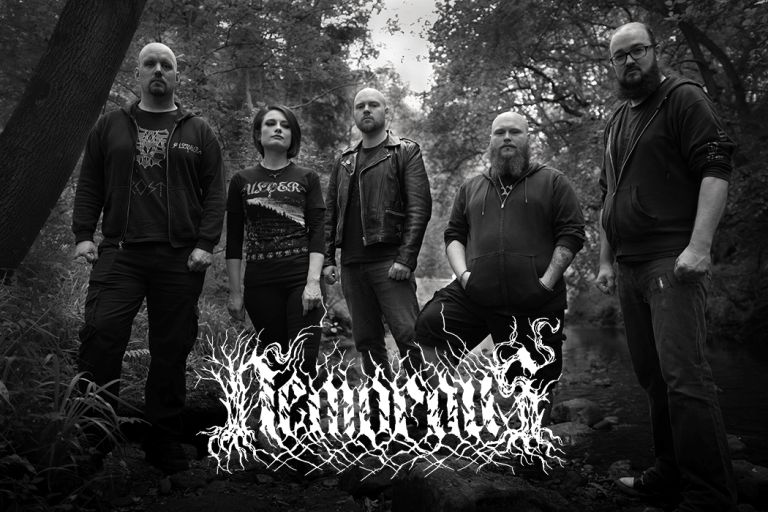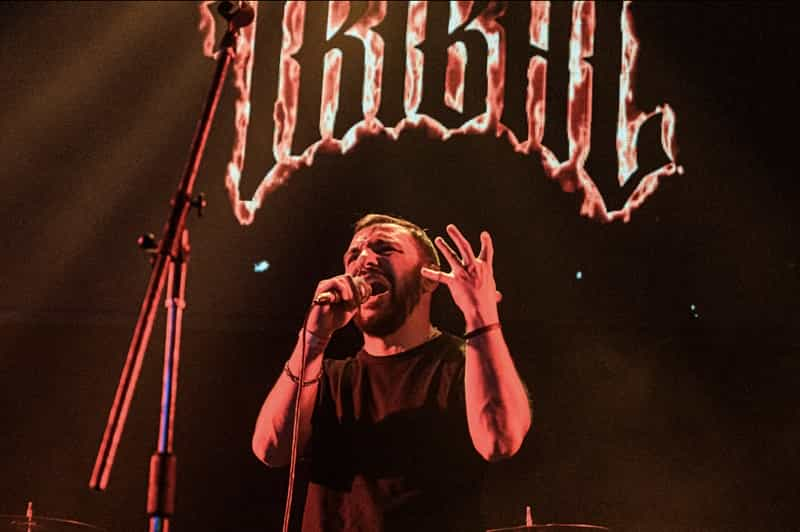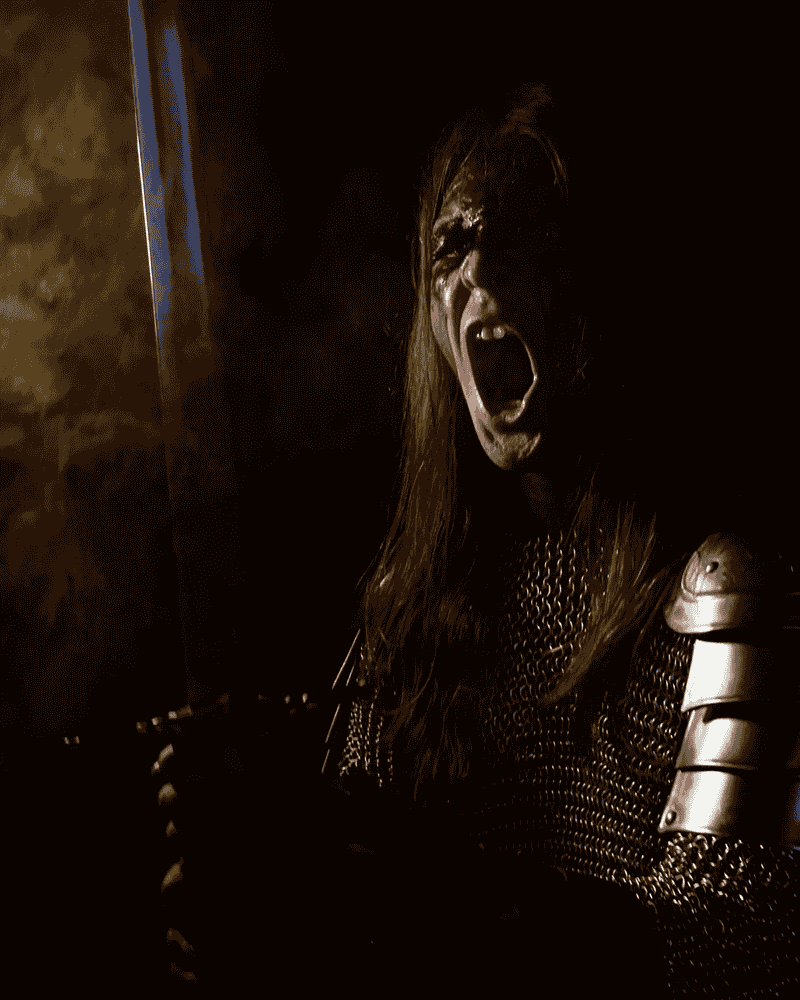Nemorous #Interview with Mike Blenkarn

Fittingly, for a band that carry deep pagan influences, the roots of Nemorous stretch out like those of a tree, with the members having collectively served in a plethora of other bands. Probably for none of them is this more true than in the case of guitarist Mike Blenkarn, who kindly took the time to answer some of my questions.
When reviewing the band’s debut record (check that out here) I struggled to put my finger on how to categorise the sound of Nemorous. Happily Mike cleared the matter up swiftly (spoiler alert): they are Atmospheric Metal. Mike was a very eloquent interviewee. I’m sure you’ll enjoy his thoughtful and insightful answers to my questions.
Thanks for agreeing to this interview for Blessed Altar Zine. First of all, who is Nemorous and what does each person contribute to the band?
Mike: I’d describe Nemorous as an atmospheric metal band, mostly based in the North East of England. We’ll come to the slightly vexed question of genre in a bit! The lineup at the time of recording our debut EP was Chris Walsh on guitar and vocals, myself on guitar, Phil Heckles on bass, Alexandra Durning on keyboards, and Ian Finley on drums.
Unfortunately since we received this interview, Chris has made the decision to step away from the band for personal reasons so we are currently in the process of recruiting new members. In the meantime the other four of us have been busy writing the songs for our first album proper.
Congratulations on your debut record. How happy are you with how it turned out and how has the reception been so far?
Mike: We’re very pleased with how it turned out, especially considering the surrounding circumstances of the recording. We managed to record the drums, vocals, Hammond Organ and Rhodes Piano parts in the studio, flying by the seat of our pants just two or three weeks before the country locked down due to the Coronavirus crisis, and we had to complete everything else from the rest of the instrumentation to the final mix in our respective homes.
It’s easy to say there’s things I would have done differently if the opportunities had been there (studios remaining open and money being no object), but I think Walshy as the mixer did a very admirable job of pulling it together! We were originally expecting to release the EP ourselves as a demo/promo affair, so for Bindrune Recordings to get behind it so enthusiastically and show such belief in the material really meant a great deal to us.
We’ve been delighted by the reception, I honestly couldn’t ask for more. It’s been especially heartwarming how many of our friends and peers from the Wodensthrone days have supported and encouraged us.
Most of the band previously played together in Wodensthrone. Why did that musical project come to an end and how did the decision to form Nemorous come about?
Mike: Wodensthrone came to an end following the departure of founding guitarist Wildeþrýð. After some soul-searching we mutually felt that it wouldn’t be appropriate to continue the band without him. However, the rest of us were still very keen to work together and moreover to continue creating music in a similar vein. Nonetheless, Nemorous has provided the opportunity to make a fresh start thematically and with a different modus operandi. Over the course of Wodensthrone’s career it developed from quite a specific Anglo-Saxon theme and aesthetic to a much more open and global frame, and we took the opportunity to complete that process and sever the band conclusively from any single worldview.
Although it sounds like the band has many influences, Black Metal seems to be at the heart of Nemorous. What is Black Metal to you and what makes this genre of music so appealing to the band?
Mike: The black metal label is something I’m resigned to rather than embracing, if I’m honest. There’s never really been an adequate nomenclature for non-Satanic black metal, particularly of the more mystical foresty ilk like us, and thirty-odd years into the growth process for this form of music that horse has well and truly bolted. My own experience of black metal, particularly in darker and more malign forms, is either as an expression of the Unheimlich or as a kind of musical performance of the Jungian “confrontation with the unconscious/shadow”. I don’t think Nemorous ticks either of those boxes but I also appreciate that it’s not an unreasonable term for this sort of music and also that other people might see the stratification I’m talking about as the narcissism of small differences! As a signpost, it does a basic job, but I don’t feel like it’s where we end up, if that makes sense?
I thought the band really makes the cover of “The Wind that Cracks the Leaves” its own and it’s a nice nod to a band (In Gowan Ring) that is very far from Metal in style. Why did the band choose to cover this track and what non-Metal elements have found their way into Nemorous’ sound?
Mike: It’s a track I heard in the mid-noughties and was immediately captivated by. The whole album it comes from (“Hazel Steps Through A Weathered Home”) is just a gorgeous, gentle, autumnal album, and that track is a particularly haunting highlight. The minimal, hypnotic quality of the original is perfect and I love it just as it is, but it also sparked off a lot of ideas to me for different arrangement possibilities, weaving the melody and harmonies in and out of the instrumentation in multiple ways. I worked out a few different arrangements of the main theme and then strung them together in a way that felt like a natural dynamic build. The string overdubs from Katie (Violin) and Jon (Cello) from A Forest Of Stars were the icing on the cake.
For me, when I’m writing original material for the band I’m pretty much trying to zone into that same autumnal, melancholic sweet spot, just in metal terms. I try to take a textural approach to the guitars that takes account of timbral nuance and building up the most effective frequency layers into a warm and enveloping wall of sound to create that pastoral feel, and I’ll employ any element (and draw on anything and everything musically speaking) that makes sense to reinforce that. That might end up being Enslaved, Anathema, Nick Drake or Vaughan Williams or something else. Not trying to toot my own horn about how bohemian my musical tastes are, more trying to emphasise that we’re pursuing a particular feeling or aesthetic that isn’t defined by genre or form. Something I’m really pleased with on the EP is the presence of the Rhodes piano, which adds just a little touch of early Portishead.
There’s a certain atmosphere to the record (also the name of the band and the album cover) that hints at paganism and a focus on nature. Do you feel there’s a certain philosophy underpinning the band? What identity does this record and the band in general express?
Mike: There’s definitely a philosophy there that aligns with paganism but our intention with Nemorous was to eschew any specific mythos and instead look at shared archetypes and convergences across the human experience of spirituality, and the underlying psychology of spirituality as an experience and an anchor for worldview. I’d generally describe myself as a Humanist on a good day and an Absurdist on a bad day so my interest tends to be ultimately in how we generate meaning for ourselves and “spirituality” as an emergent property of that process. Lyrically we try to pinpoint commonalities of human experience in quite an abstract way, particularly dealing with the perennial sense of impending doom that every generation has but that seems particularly palpable now with the climate crisis, the rise of populism and neo-nationalism, etc. The nature theme ties into the typical concepts of renewal, equilibrium and harmony with the world around us, with all the critique of post-industrial/neoliberal/ capitalist realism that this implies.

These days people are more and more getting their music digitally (whether downloading or streaming). How important was it for the band to release the album on vinyl rather than just on CD or digitally?
Mike: I still prefer to consume music on physical formats so for me personally it gives it a reassuring substance. I know it’s all in my head but I can’t help but find the experience of listening to music online more ephemeral and disposable. I pay for Spotify but for anything I really like I tend to get a physical version sooner or later. In the back of my head I know this isn’t especially sustainable or eco-friendly but I seem to be completely embedded in this medium for consuming music – this is my personal hypocrisy to resolve in my own time. I do like that the internet is increasing the democratisation of music and making participation more accessible though.
I’m hopeful that I’ll soon stop asking bands Covid related questions, but did the pandemic impact on the making of the album?
Mike: I guess I’ve already covered this to an extent, but the other aspect is that inevitably all the shows we had organised to help celebrate and promote the launch fell to bits. Thanks to local as well as national lockdowns we’re actually only just about to have our first rehearsal since last July in order to try out/inaugurate new members; that rehearsal in itself was the first since before the crisis hit. So it’s going to be great to blow the cobwebs off the songs and start preparing for doing things in public again.
The impact of the crisis was also strongly implicated in Walshy’s decision to leave, in the sense that it brought the considerations he was having into sharp relief and escalated that process.
Are there any books, art or movies that have been a recent inspiration (not necessarily directly influencing the band, but just generally in life)?
Mike: Me and Alex have just started watching Twin Peaks again from the top. That’s one everyone in the band agrees on. We all read a lot though so it’s difficult to pin down any one influence. Recently I’ve been reading a lot of Mark Fisher’s stuff, which is fascinating and that I’d highly recommend (“Capitalist Realism”, “Ghosts Of My Mind”, “The Weird & The Eerie”).
Now that the record has been released what does the immediate future have in store for Nemorous? Is the band planning to perform on stage?
Mike: The immediate future is to cement our new lineup, get back into a regular programme of rehearsals, get ourselves in gigging shape and crack on with new material. We’re all fed up with having had a hiatus imposed! We’re currently in talks for several new and rescheduled gigs so keep an eye on our Facebook page for the announcements.
And finally is there anything else there you’d like to mention or promote?
Mike: For anyone who hasn’t heard them, please check out Katie and Jon’s band A Forest Of Stars – they’re unique and wonderful. Absinthe-addled black metal by gaslight.
Thanks again to Mike for his time. The self-titled debut by Nemorous is out now on Bindrune Records and if you’re determined enough you may still be able to get hold of a vinyl+CD copy. US readers can try the label’s webstore, EU dwellers can try here for example. Follow the band on bandcamp and Facebook to keep up to date with news, shows and future releases.
Label
Bandcamp
Facebook
Webshop
Instagram
YouTube
Twitter
**Please support the underground! It’s vital to the future of our genre.**
#WeAreBlessedAltarZine
#TheZineSupportingTheUnderground


